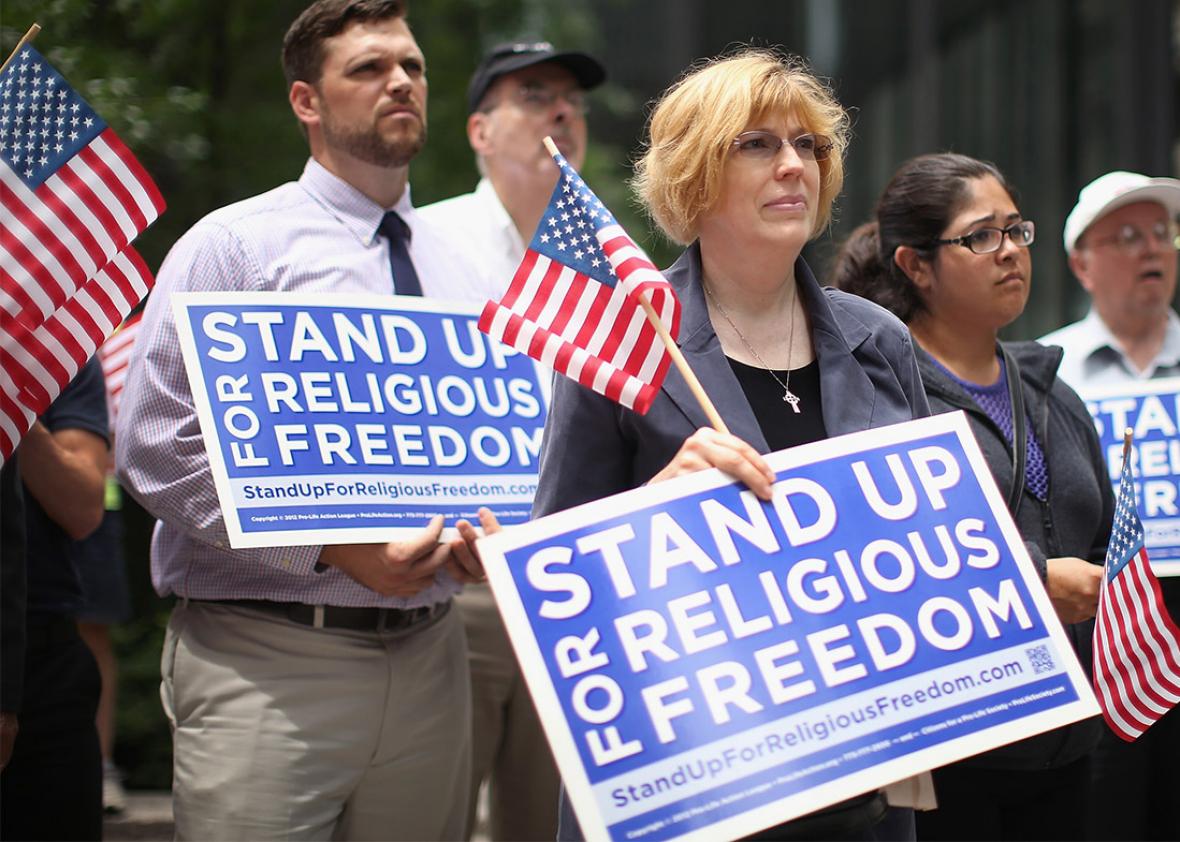What with New Hampshire primaries and Zika scares and Syria deals, you might have missed that it was also a big week for “religious liberty.”
In West Virginia, Republican state senators offered up a bill that would make Roy Moore weep with joy: The sweeping proposal would allow for claims of religious liberty so broad as to not only justify discrimination but could also allow anyone to break the law if it offends their religious convictions.
Senate Bill 11 would amend the state constitution to create the “West Virginia Freedom of Conscience Protection Act,” which does two things: It ensures that “in all cases where state action burdens the exercise of religion, strict scrutiny is applied” and “provide[s] a claim or defense to a person or persons whose exercise of religion is burdened by state action.” This vague and broad language will protect anyone who wants to use religious justifications to discriminate against, say, LGBT renters or customers, but may indeed be so broad that it becomes a defense for those who claim they broke any law for religious reasons.
As Michael Stone noted at Patheos: The proposed language of the amendment establishes that only a “governmental interest of the highest magnitude that cannot otherwise be achieved without burdening the exercise of religion” can justify intruding upon one’s religious convictions. Civil rights lawyer Tim Peacock, writing at Peacock Panache, explains that the protections afforded under the proposed legislation “surpass every other state-level RFRA law.” Under the proposed language, protected expression of religion “includes, but is not limited to, the ability to act or refuse to act in a manner substantially motivated by one’s sincerely held religious beliefs or religious conscience, whether or not the exercise is compulsory or central to a larger system of religious belief.”
It matters not at all that your own religious conviction is not a central or even established tenet of your faith. It matters only that you believe it. And perhaps more radically, Peacock notes, the new law “would create a special class of rights wherein one civil right comes into conflict with another, religious belief would always prevail.”
In the event that this is not plainly the point, listen to the words of House Majority Whip John O’Neal, defending the (slightly narrower) West Virginia House version of the religious liberty legislation, House Bill 4012, that passed handily this week: The Constitution “doesn’t guarantee anyone’s right to have any particular kind of lifestyle or behavior protected, but it guarantees the free exercise of religion,” O’Neal said. “That freedom has been severely curtailed in recent years with the growth of gay rights and mandated contraception coverage under Obamacare, among other things.”
In other words, under this state Religious Freedom Restoration Act, religious freedom is no longer just a shield but a sword to justify disregard of other, lesser rights of the nonreligious.
A second jaw-dropper comes this week from Arizona, where the mayor of Chino Valley, Arizona, who decided the time had come to “draw a line in the sand,” had an objecting rabbi removed from a town council meeting so he could lead a prayer to Jesus at its conclusion. You can watch here.
Mayor Chris Marley, who is also a pastor, had said before the January meeting that there would be no closing prayer, because the council had received negative feedback about sectarian prayers. Rabbi Adele Plotkin of Chino Valley’s Beit Torah congregation checked in advance of the meeting that there would be no public invocation offered. The mayor confirmed with the press that there would be no prayer as the council determined what to do about the prayer policy. But something overcame him, and he not only offered up a prayer at the opening of the meeting, “in the name of my lord and savior, Jesus Christ,” he also explained, in an opening statement, his constitutional rationale:
Unfortunately, the content of the invocations offered here in Chino Valley has become the subject of some contention, so we—your Town Council—will deal with it. Our Bill of Rights protects us against the establishment of religion by the state, and yet it would appear that secular humanism with its mantra of political correctness has become just that, the state established religion which the First Amendment was supposed to protect us against.
Our oath of office requires that we defend the Constitution, and yet we are being asked to give up our right to freely worship according to the dictates of conscious [sic]. As a nation, we have already lost a number of our freedoms: The right to peacefully assemble and our protection against unreasonable search and seizure are already gone, and a number of others are being stripped away as we speak.
When Rabbi Plotkin stood up to complain that the prayer was sectarian, the mayor ordered two Chino Valley police officers to escort her from the council chambers.
But maybe the real winner in the religious freedom umbrage sweepstakes was Ted Cruz, who said in an interview with The Wilkow Majority radio program that we are a single Supreme Court justice away from having a blank check to desecrate religious cemeteries. As he put it: “We are one justice away from the Supreme Court ordering veterans’ memorials to be torn down over this country. And we are not far away from them ordering the chisels to come out to take off the crosses and the Stars of Davids on the tombstones of our fallen soldiers.”
It’s not true of course. But in the Olympics of fake religious oppression of believers, it certainly serves the desired goal: Ensuring that in the name of expressing your own faith, everyone else will get to be a tiny bit less free.
